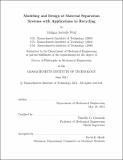Modeling and Design of Material Separation Systems with Applications to Recycling
Author(s)
Wolf, Malima Isabelle, 1981-
DownloadFull printable version (15.62Mb)
Other Contributors
Massachusetts Institute of Technology. Dept. of Mechanical Engineering.
Advisor
Timothy G. Gutowski.
Terms of use
Metadata
Show full item recordAbstract
Material separation technology is critical to the success of the material recycling industry. End-of-life products, post-consumer waste, industrial excess, or otherwise collected materials for reuse are typically mixed with other incompatible materials. These materials must be segregated using material separation processes. This thesis investigates the performance and design of material separation systems for recycling through modeling material flows within these systems. The material separation system models developed here are suited to material recycling because they encompass all types of separation process and any configuration of those processes as well as treat binary and multi-material streams. These models capture the material behavior of separation systems through mass ow balance equations constructed using system configuration and process performance data. The Bayesian material separation model is used to capture the performance of separation stages processing a binary material mixture, while the material separation matrix model, developed here, captures the performance of stages processing multi-material mixtures. A network routing model is used to describe the links between processes within a separation system. The governing mass ow balance equations constructed from the process performance and routing data form systems of linear equations. These equations can be generated and solved programatically. Separation performance can be captured through experimental methods or through physical modeling, but an investigation with either suggests that performance can vary under differing material input conditions and operational settings. Techniques for coping with these effects and potentially using them to tailor system behavior are discussed in a case study on the magnetic roller separation of beverage container shreds. Two case studies use tailored economic metrics to evaluate decisions in the design of separation systems. The effects of operating decisions on an existing plastic container separating line are quantified by evaluating the additional profit from plastics-capture decisions. The second case study investigates the economics of installing a plastics separating line at an energy from waste facility. Modeling suggests several possible configurations for a plastics separating line that outperform configurations suggested by industry experts, showing that the material separation system models developed in this work can provide design guidance in the recycling industry.
Description
Thesis (Ph. D.)--Massachusetts Institute of Technology, Dept. of Mechanical Engineering, 2011. This electronic version was submitted by the student author. The certified thesis is available in the Institute Archives and Special Collections. Cataloged from student-submitted PDF version of thesis. Includes bibliographical references (p. 179-193).
Date issued
2011Department
Massachusetts Institute of Technology. Department of Mechanical EngineeringPublisher
Massachusetts Institute of Technology
Keywords
Mechanical Engineering.